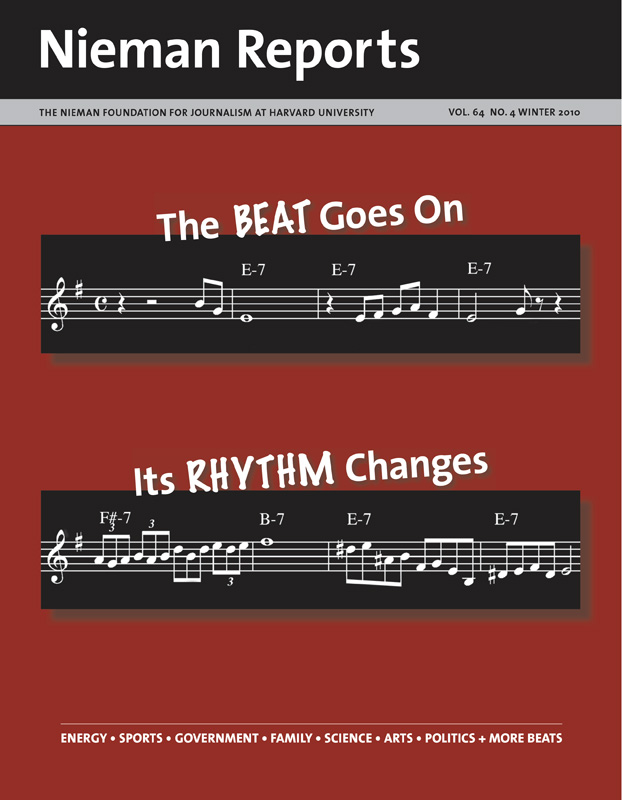
Bloomberg Government’s beat is where industry and lawmaking intersect.
One of the enduring mysteries for an editor lies in trying to divine what readers really want. There are almost as many answers to that question as there are readers, and the more editors try to meet everyone’s needs, the less they are able to meet anyone’s. Breadth trumps depth and coverage loses its focus. The idea of a reporter covering any single beat—with anything approaching the level of expertise that gives readers a value-added dimension—becomes a quaint anachronism.
In recent years, the beat has become the Rodney Dangerfield of journalism: It just doesn’t get the respect it deserves. That approach, however, is about to undergo a radical transformation as journalism, searching desperately for its future, begins to discover, once again, the profound value of expertise, exclusivity and depth. Those are the elements, it turns out, that imbue content with value, a process, I would argue, that holds the key to journalism’s future success.
The next wave of journalistic progress will channel its power from the underlying principle of the reporter’s beat: the creation by an expert of valuable content that readers need and can’t find anywhere else. This proper emphasis on expertise promises to give rise to a subscription-based business model in which people will pay for exclusive content they value. It’s a way to resolve the question dogging journalists as they search for resources to fund reporting. Unless readers recognize value in what they are getting, they are unwilling to pay for its production.
Right now I’m fortunate to be involved in helping to build a venture founded upon that premise. It’s called Bloomberg Government (BGOV), and it may hold some important lessons for the future of journalism. This online service, launched as a private beta website in July 2010, focuses on the business implications of government actions, namely legislation, regulation and spending. When BGOV launches in January 2011, it will offer exclusive news, data and analysis targeted at government and business leaders. Our goal: to give our subscribers—at a cost of $5,700 a year—the detailed information they need to help them make timely and effective decisions.
Expertise as a Bridge
A central premise of BGOV is that there is a need in Washington and across corporate America for in-depth information about the intersection of business and government. The impact government decisions have on business has increased dramatically in recent years and so has the desire to better understand one another. BGOV bridges that gap, in large part, by building an editorial model that adopts the best of a beat-reporting approach. Here are thumbnail descriptions of some aspects of Bloomberg Government that replicate the focus, expertise, exclusivity and depth of a beat:
A Laser-Like Mission: BGOV is all about the business impact of government actions, which fosters a sharp focus and a reassuring clarity. We won’t try to be all things to all people; we will favor depth over breadth.
A Well-Defined Audience: It will be decision-makers in Washington, from Capitol Hill to K Street, and leaders of corporate America outside the Beltway. Knowing who is in your audience makes it easier to know what they need—and to give it to them.
Deep Niches: BGOV is designed to target certain subject areas: health care, energy, defense, technology, transportation, finance, trade, taxation, labor and government contracting. We understand what’s important to subscribers about those issues, and by diving deeply into those niches we’ll distinguish our content offering.
Exclusivity: Our goal is to produce exclusive content—i.e., high-value reporting—that subscribers won’t find elsewhere. We’ll zig while others zag.
A Unique Editorial Model: We are melding teams of journalists and analysts to create a hybrid editorial model. The analysts will include economists, financial experts, former Congressional and regulatory staffers, and industry veterans, who will convey a different blend of perspectives and enable us to produce original research along with financial and economic models to quantify the impact of various government actions.
Expertise: The value we place on experts undergirds this effort—and aligns it with the concept of journalistic beats. While other publications are cutting costs and retreating from beats, BGOV is embracing the expertise that comes from them. Most of the journalists we’re hiring arrive with years of experience covering beats such as health care policy, technology and defense. Similarly, many of the analysts we’re signing on—whether they are academics with PhDs or industry veterans—bring with them the deep knowledge that comes with study and direct experience. Of course, these experts will also act as mentors to younger reporters as they learn these beats.
Online Innovation: BGOV will, of course, provide an array of online features to amplify our reporters’ and analysts’ expertise. There will be data visualization, ranging from in-depth graphics and charts to interactive displays, and tools such as a report builder, online directories, and mapping capabilities.
Bloomberg Government, a part of Bloomberg News, is a natural outgrowth of Bloomberg LP, created by Michael Bloomberg, now the New York City mayor, almost 30 years ago. He launched Bloomberg News for financial professionals, and the company has been continuously enhancing the database-driven product. Back then, Bloomberg identified a market need, created a unique product based on deep expertise, and built an immensely successful business.
In the landscape of 21st century journalism, it makes perfect sense to take this model as our foundation and build on it a reporting strategy—designed around the 20th century notion of expertise emerging from dedicated beat reporting—to fit an evident need.
Mike Riley, a 1995 Nieman Fellow, is managing editor of Bloomberg Government.



